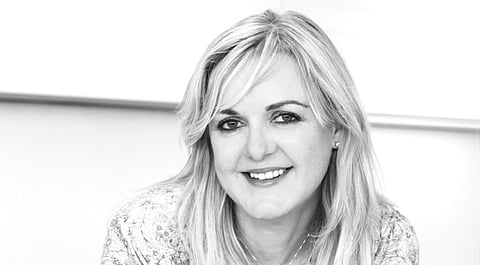Palm Jumeirah resident’s holiday home success story
Airbnb has been a boon for homeowners with an entrepreneurial drive

Recent market research from Chesterton Mena revealed a staggering 421 per cent increase in Airbnb property revenues for Dubai listings between August 2015 and August 2017 reaching $3.3billion (Dh12.11 billion), and with the choice of accommodation options growing threefold over the same period to 3,249 listings, mi casa is definitely su casa (my house is your house).
Officially given the operational green light in May 2016 by Dubai’s Department of Tourism and Commerce Marketing (DTCM), Airbnb now offers rental options from a cozy dorm bed with breakfast for just Dh75 per night to a palatial six-bedroom Palm Jumeirah villa for Dh5,000 per night.
Home comforts
Leigh-Ann Steele, an interior designer and owner of bespoke baby line company, Butterscotch, hasn’t looked back since putting her one-bedroom Palm Jumeirah Shoreline apartment onto the holiday rental market in December 2015.
She previously renovated and sold a similar one-bedroom unit to move to a larger home, but decided to reinvest the profit from the sale in a second apartment targeting the tourist market.
“We completely remodelled and renovated the apartment, so when you walk in you wouldn’t recognise it as an original Shoreline apartment. We took walls down, redid the flooring, put in a brand new kitchen and bathrooms and even retiled the balcony,” she says.
While the monochrome-styled apartment clearly fits the upmarket image of a Palm Jumeirah holiday pad, she was careful not to go completely overboard when it came to budget. “For a holiday home you don’t need to have the latest Miele washing machine or wooden flooring,” says Steele. “For example, we put in luxury vinyl tile flooring in an authentic wood-look finish, which is very hardwearing, and the glasses are from Ikea. For linen, I always use really high-quality, hotel-grade products as this is something that guests definitely notice. The only issue I have is that the laundries here tend to use really strong cleaning chemicals, so I have to replace things fairly often.”
It’s this level of investment and attention to detail, plus a beach club bonus, that Steele believes has driven consistent demand for the apartment, with an average annual occupancy of around 80 per cent.
Cost of renting
Post-renovation but before debuting the property online, Steele’s first step was to register the apartment as a holiday home on the DTCM online permitting system, and pay the requisite fees (see guide). And then there are the Airbnb fees: the host is charged 3-5 per cent service fee for every completed booking. In addition, she needed to arrange for home contents insurance and purchase a fire extinguisher and fire blanket in line with health and safety requirements.
“Airbnb offers home insurance, which covers the owner for accidental damage up to a certain threshold, and we also had our own building and contents insurance.”
The apartment currently rents for around Dh900 per night, which includes the apartment servicing fee, and Leigh-Ann puts cleaning and laundry costs at Dh400 per guest turnaround (regardless of length of stay). The average length of stay she says is five to seven nights, and if guests want daily or mid-week full cleaning, there is an additional charge.
“We also had a beach closure for the last nine months and had to pay Dh200 per day for our guests to use the adjacent beach, which was an unexpected cost,” she adds.
The Airbnb set-up is extremely flexible when it comes to rate setting. “You can play around with the pricing, so if you see that bookings are low next month, you can adjust the price; and this all happens at the click of a button.”
All about the ratings
The final step in the process was to create the apartment listing, which took just two hours from concept to clickable booking. “It was the easiest thing ever. Once I’d taken pictures of the apartment on my iPhone, we sat over coffee to write the description then uploaded everything, and we were live.”
While location is a natural selling point, review ratings are key to attracting new guests. “As soon as we started getting positive reviews and comments, our occupancy rate shot up. Within the first three months we were running at an average of 85 per cent,” she says. “The slow summer months can obviously hurt us, but both years we’ve had longer term lets, which has covered us financially.”
Guests check in to find a welcome pack containing room temperature and chilled water, tea, coffee, milk (low and full fat), breakfast cereal and fruit, a small supply of dishwasher and washing machine tablets and other household basics, and the Dubai and local area guide.
“This is extremely well received and the more information you can provide a guest with, especially a first-time visitor, the better your reviews,” she notes. “If the guest provides us with a shopping list, we can also arrange for the fridge and cupboards to be stocked with their preferred products prior to arrival, as a supplementary paid service.”
Steele’s guestbook spans the world with visitors from across Europe and the US to Russia, Saudi Arabia and Uganda.
Extra care
In the two years since she put the apartment on Airbnb, Steele has yet to recount a hospitality horror story, but is very hands-on when it comes to managing the process from booking to departure.
“I make sure that I check the apartment after every clean and guest turnaround — you have to. And we have a strict no party rule in place, although you never know what could happen.”
Sign up for the Daily Briefing
Get the latest news and updates straight to your inbox



